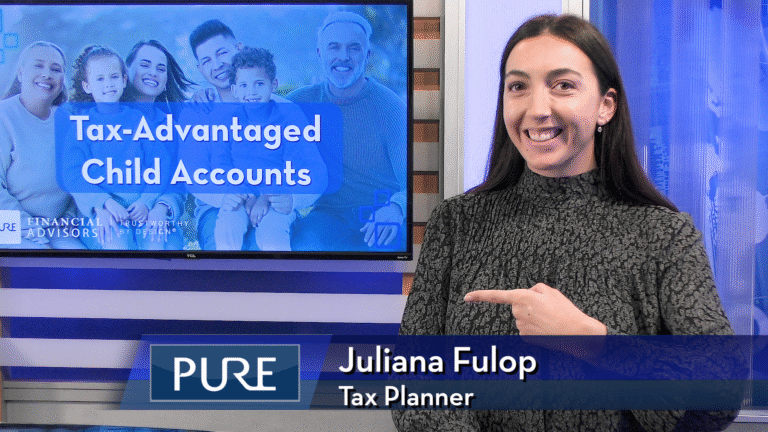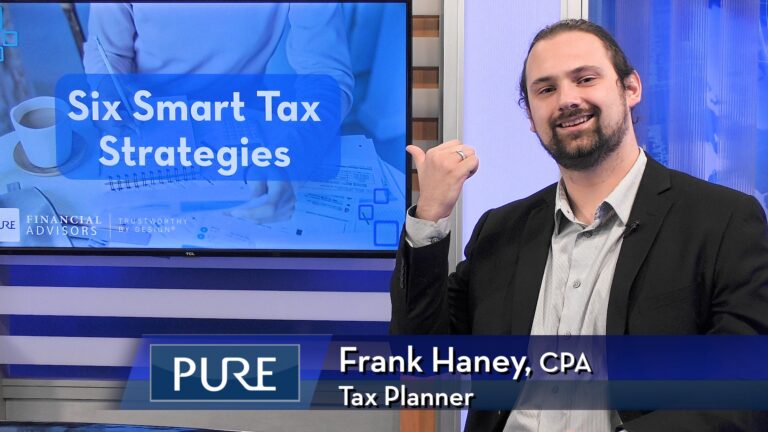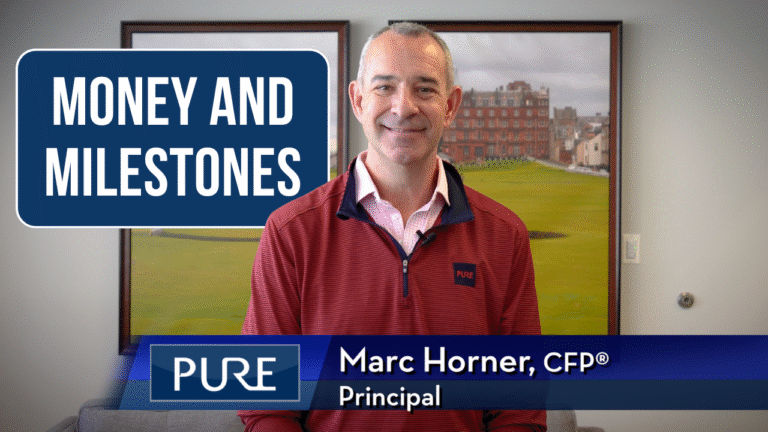The stock market has gone wild! Or, more accurately, pockets of the stock market have gone crazy. Previously beaten-down companies like GameStop, AMC, and Blackberry have soared in 2021, accompanied by eye-popping gains and jaw-dropping volatility, thanks to users on the website Reddit. In this video, Brian Perry, CFP®, CFA®, Executive Vice President and Director of Research at Pure Financial Advisors, recounts what happened, where we are now, and whether you should get involved. Brian also explains what “going long,” “shorting a stock” or “going short” means, and he defines a “short squeeze.”
LISTEN | YMYW Podcast 310a: [SPECIAL] GameStop: Stocks Gone Wild!
READ | BLOG – Stocks Gone Wild: Should You Join the Day Trading Craze?
TRANSCRIPT
Hey, Brian Perry, Executive Vice President, Director of Research, Pure Financial Advisors here, bringing you a couple of minutes here, just wanted to talk a little bit about what’s going on with GameStop. GameStop, AMC, really the topic being stocks gone wild. We’ve been in a crazy environment here. I’m filming this, it’s February 2nd, a Tuesday, the end of the trading day. Just wanted to update everybody. We also have a podcast special edition we put out, as well as a blog on some of the craziness going on in stock markets.
And really, a lot of it is around a small handful of stocks, stocks like GameStop. Right. GameStop, a company in the retail sector, brick and mortar, sells video games, haven’t been doing very good. Stock was down in the low single digits, three, four dollars a share last summer, gradually rose, and then this year just absolutely skyrocketed. Hit as high as you can see here, mid-January, just a couple of weeks ago, the stock was at 40 bucks a share, and then went up as high as about $350, $400 a share, fell, bounced back, fell again. Down as of this recording, again, down about two thirds in the last two trading days. So incredibly volatile stock, another one of them being AMC. No great mystery why AMC movie theaters haven’t been doing well. We’re in a pandemic. Nobody can go to the movies, fighting bankruptcy, all of 2020. Then a big rally here, went from $2 to $20 before falling and back down now at about $7 or $8 a share after trading at only $3 here on January 19. So incredible volatility. First is why?
Well, what’s happened is that a small band of traders on the social media site Reddit really got involved in these stocks and decided to drive them higher. They found these companies and started buying them collectively. They talk to each other back and forth on these chats, started buying these companies, driving the price higher. Why did they identify these stocks? Well, there were a couple of fundamental drivers around the companies. But the bigger thing is these companies had high levels of short interest. So you might be asking yourself what the heck is short interest? And basically, when you buy a stock, it’s called going long. So you buy a stock, you go long, that means you think the price is going up. But what if you think the price is going lower? Well, at that point, what you can do is you can go short. And when you go short, what you do is you borrow stock that you don’t own and you sell it hoping the price falls.
If the price falls, you buy it back. You make a profit between the difference of where you sold it, and where you buy it. However, it’s really risky because if the price goes up, you’ve got to buy it back to deliver it still. You sold it at ten. Maybe it’s gone to $15. That difference that $5 a share, you’ve lost that money. That’s loss of capital. There’s no limit to how high stocks can go. So theoretically, there’s unlimited risk when shorting. Most of the players that are shorting stocks are big institutions, hedge funds, Wall Street firms, that kind of thing. Right.
So but anyway, a lot of these records are public and there’s something known as a short squeeze. And what a short squeeze is, is it’s when somebody is shorting the stock, remember, they need to deliver it at some point and buy it back. So what people will do is they’ll identify these companies and start buying them to drive up the price. And remember, I owe the stock. So if I sold it at $10 and the stock goes to $15, $20, $25, at some point I’m going to say no mas, I can’t take anymore. I can’t take any more losses. I need to buy it back to close out my position, eat my losses, walk away to fight another day.
Well, if people are buying the stock to drive the price higher and then the people that had previously been betting it’s going to go down start buying, it can turn into a snowball effect where there’s upward momentum to drive the price higher. That’s what’s known as a short squeeze. That’s what’s been going on with AMC and with GameStop here in the last couple of weeks. Right.
And so it’s important to remember that what goes up a bunch can also go down a bunch. Again, look at these price movements higher. Look at this volatility to the upside, but then the sharp declines. Right? Same thing here with GameStop: rallied from $40 on the 20th to over $400, a tenfold increase in the course of a couple of weeks, followed by almost a 75% decline. So any time you’re going to get involved in some sort of hot sector, you need to understand that the volatility goes both ways. Right?
So what’s the takeaway from all of this is simply this: in the short run, emotions can rule the day, but in the long run, fundamentals matter. And what I mean by that is that there’s a famous saying on Wall Street that in the short run, the market is a voting machine. In the long run, it’s a weighing machine. So sentiment can drive a stock higher when it gets going, right? These things start with fundamentals. Emotion takes over, drives them higher or lower. In the long run, stocks find their true value.
Also, there’s a big difference between trading and investing. When you’re trading, you’re making a wager as to what you think somebody is going to be willing to pay for whatever, whether that’s a stock, whether that’s Bitcoin, gold, whatever investment it is, you’re making a wager as to what somebody else will pay for it at some future date. You’re basing that off sentiment and emotion. When you’re investing, it’s usually a longer-term enterprise where you’re looking at what kind of cash flow something will kick off in the future, and you’re discounting those cash flows back to net present value. So trading is more emotionally focused, whereas investing is much more crunching the numbers. Neither is a good or bad exercise, but it’s really important to understand the differences.
And so when you see the frenzy going around, around GameStop, AMC or anything else, what do you need to ask yourself is should you get involved? And that’s for you to decide, whether to buy any one stock or whether to get involved in any one situation. But here’s the key thing: if you are going to get involved, make sure you do it in a way that you can survive if you’re wrong. Because if you bought the stock at 10 and it goes $400 or something like that, you’re in a great spot. However, if it falls sharply, you’ve lost a lot of money, right? And so you need to make sure that if you’re going to trade, if you’re going to get involved in these speculative ventures, you can survive any potential losses.
The world is a volatile place, whether it’s pandemics, politics, stocks gone wild like we’ve seen recently, right, this craziness in the financial markets. If you want to know more about what’s going on with GameStop, AMC and these other stocks, what it means for your finances, if you want to know more about your tax situation, your finances in general, your cash flows, talk to a CERTIFIED FINANCIAL PLANNER™, visit us PureFinancial.com. We’ll have one of our CERTIFIED FINANCIAL PLANNERS™ sit down with you, go through a free financial assessment, visit us at PureFinancial.com. There’s a big green button that says get a free financial assessment. No charge, no obligation. We’ll take a look at what’s going on in the world, what it means for your finances, your taxes, etc. Again, Brian Parry, Executive Vice President, Director of Research, Pure Financial Advisors. Hope you enjoyed this video on Stocks Gone Wild.
IMPORTANT DISCLOSURES:
• Investment Advisory and Financial Planning Services are offered through Pure Financial Advisors, LLC. A Registered Investment Advisor.
• Pure Financial Advisors, LLC does not offer tax or legal advice. Consult with a tax advisor or attorney regarding specific situations.
• Opinions expressed are subject to change without notice and are not intended as investment advice or to predict future performance.
• Investing involves risk including the potential loss of principal. No investment strategy can guarantee a profit or protect against loss in periods of declining values.
• All information is believed to be from reliable sources; however, we make no representation as to its completeness or accuracy.
• Intended for educational purposes only and are not intended as individualized advice or a guarantee that you will achieve a desired result. Before implementing any strategies discussed you should consult your tax and financial advisors.
CFP® – The CERTIFIED FINANCIAL PLANNER™ certification is by the Certified Financial Planner Board of Standards, Inc. To attain the right to use the CFP® designation, an individual must satisfactorily fulfill education, experience and ethics requirements as well as pass a comprehensive exam. Thirty hours of continuing education is required every two years to maintain the designation.
AIF® – Accredited Investment Fiduciary designation is administered by the Center for Fiduciary Studies fi360. To receive the AIF Designation, an individual must meet prerequisite criteria, complete a training program, and pass a comprehensive examination. Six hours of continuing education is required annually to maintain the designation.
CFA® charter – Chartered Financial Analyst® designation contains three levels of curriculum which includes analysis using investment tools, valuation of assets, and synthesizing the concepts and analytical methods in a variety of applications for effective portfolio management and wealth planning. Candidates must meet enrollment requirements, self-attest to professional conduct, complete the approx. 900 hours of self-study, and successfully pass each level’s 6-hour exam to use the designation. CFA Institute does not endorse, promote, or warrant the accuracy or quality of Pure Financial Advisors. CFA® and Chartered Financial Analyst® are registered trademarks owned by CFA Institute.











